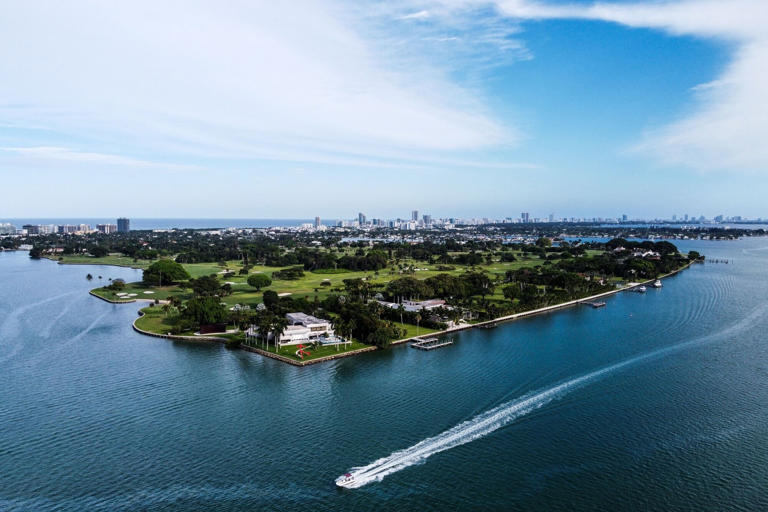The 1.84-acre (0.74-hectare) lot is situated on Indian Creek, a man-made barrier island famously known as “Billionaire Bunker.” Ilya Reznik, the broker handling the sale, declined to disclose the seller’s identity but mentioned they are “willing to negotiate” on the asking price. “I’ve already conducted a couple of showings, and naturally, the buyer will be a billionaire,” Reznik noted.
Even if the 1.84-acre waterfront lot doesn’t sell for the asking price of $200 million, broker Ilya Reznik believes it will still set a regional record, largely due to its proximity to Amazon founder Jeff Bezos’s properties. Since 2023, Bezos has purchased three properties on Indian Creek, including two next to the lot now for sale. In his most recent purchase earlier this year, Bezos paid approximately $87 million.
“I think $200 million is a bold asking price, but I’m confident the buyer will pay a bit more because Bezos is a neighbor,” Reznik said. “Prices like these didn’t exist before he moved to Indian Creek.”
The lot was purchased in 2018 for $27.5 million by SMM Sunny Holding LLC, a Delaware-based company, according to property records. Reznik added that the current owner has drawn up pre-designs for a 25,000-square-foot (2,322.6-square-meter) estate, which will be available to the buyer.
After years of funding shortages, rising costs, and bureaucratic delays, Ho Chi Minh City is finally launching its first metro line to serve its 10 million residents.
Due to years of halted construction, some of the ticket vending machines are already outdated, as they accept coins that are no longer in circulation. Thankfully, passengers can still pay using paper money and credit cards.
The 19.7-kilometer (12.2-mile) metro line was approved in 2007 with an initial budget of 17.4 trillion dong ($683.4 million), but costs later ballooned to 43.7 trillion dong, with the original 2018 opening date pushed back.
The project, which began construction in 2012, received significant financial support from the Japanese government, according to the city’s transport department. However, it faced challenges, including a funding shortfall from the Vietnamese government, which led to complaints from Japanese contractors, communicated through the Japanese embassy in Vietnam, as reported by local media and government sources.

The rising costs of the metro project had to be repeatedly approved by Vietnam’s parliament, a slow and cumbersome process.
The metro line stretches from the historic Ben Thanh Market in District 1 to suburban Thu Duc City and the Suoi Tien Amusement Park in District 9. Ticket fares range from 6,000 dong to 20,000 dong, with free rides offered during the first 30 days of operation, which began on Sunday. The line will run 200 trips per day.
The opening of the metro line sparked excitement among residents tired of heavy traffic in the country’s financial hub. On Thursday, hundreds of people gathered at the Ben Thanh underground station, eager to take a free test ride.
“I’m so happy and proud that the city now has a metro line. It makes things more modern and convenient,” said Nguyen Thu Trang, one of hundreds of students assigned to assist passengers at the new stations on Sunday. “Some of my friends arrived early this morning and waited nearly two hours in line, but they didn’t leave until they could get on board. I also took a short ride, and I have to say it’s amazing,” Trang added.
In a city with 8.4 million motorbikes crowding narrow streets, along with an increasing number of cars and trucks carrying cargo containers, the need for a mass rapid transit line has become critical.
“It’s so beautiful,” wrote one reader in the comments section of a VnExpress article about the metro. “I can’t wait to try it.”
Meanwhile, the sound of the metro cars sparked some sarcastic remarks on social media. “The world has gone to the moon, but in Vietnam, we now have MRT to travel on,” one Facebook user joked.
Vietnam’s commercial hub also needs to accommodate a growing number of international visitors. Foreign arrivals increased by 13%, reaching approximately 4.7 million in the first 10 months of this year, according to the city government.
Ho Chi Minh City has ambitious plans for six more metro lines, according to local officials. At a conference last year, Planning and Investment Minister Nguyen Chi Dung called on the central government to address the city’s financing needs to support the expansion.
